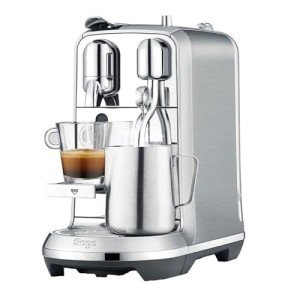Energy-Efficient Espresso Machines: A Comprehensive Guide
On the planet of coffee lovers, espresso machines are frequently considered vital devices for brewing rich, aromatic coffee. Nevertheless, Buy Espresso Coffee Machines related to these machines can cause increased energy expenses and ecological concerns. As customers become more eco-conscious, energy-efficient espresso machines have emerged as a popular option. This short article aims to explore the functions, advantages, and choices readily available in energy-efficient espresso machines, assisting coffee fans make notified choices.
What Makes an Espresso Machine Energy-Efficient?
Energy-efficient espresso machines are developed to lessen energy intake while keeping optimum efficiency. Numerous functions contribute to the energy efficiency of these machines:
- Insulation: High-quality insulation helps retain heat, minimizing the energy required to preserve optimal developing temperature levels.
- Smart Technology: Many modern machines are equipped with programmable settings that enable users to schedule developing times and change to standby mode when not in use.
- Quick Heat-up Time: Energy-efficient espresso machines typically use innovative heating technologies, such as thermoblocks or PID controllers, to heat water rapidly.
- Low Wattage: Machines that run at lower wattages consume less energy overall, making them more efficient.
- Auto Shut-off: Automatic shut-off features make sure that the machine turns off after a specific period of inactivity, additional decreasing energy waste.
Advantages of Energy-Efficient Espresso Machines
Buying an energy-efficient espresso machine can provide several advantages:
- Cost Savings: Over time, lower energy consumption can result in reduced electrical energy bills.
- Ecological Impact: Using less energy decreases carbon footprints, making these machines a more sustainable option for environmentally conscious customers.
- Enhanced Performance: Many energy-efficient designs also provide exceptional brewing technologies, resulting in better-tasting espresso.
- Toughness: Typically, energy-efficient machines are developed with high-quality components, causing greater longevity.
Functions to Consider
When picking an energy-efficient espresso machine, several features should be considered:
- Type of Machine: Options include manual, semi-automatic, and totally automatic models, each with differing degrees of user control and automation.
- Brew Quality: Look for machines that utilize high-quality brewing systems to make sure optimum flavor extraction.
- Upkeep: Some machines have self-cleaning functions that can save energy and effort in upkeep.
- Capability: Depending on individual or household size, machine capacity can affect energy consumption, with larger machines frequently requiring more power.
Popular Energy-Efficient Espresso Machines
The market offers a range of energy-efficient espresso machines accommodating various requirements and preferences. Below are some significant models:
| Brand | Design | Key Features | Energy Consumption |
|---|---|---|---|
| Breville | Barista Express | Integrated grinder, PID temperature level control, quick heat-up. | Low |
| DeLonghi | EC155 | Compact size, easy to use, long lasting construct. | Moderate |
| Rancilio | Silvia | Durable design, excellent temperature stability, and has a low ecological impact. | Moderate |
| Gaggia | Classic | Trustworthy manual operation, durable brass components, and effective steaming ability. | Low |
| Jura | E8 | Completely automatic, clever functions, and a detachable brew group for simple cleaning. | Low |
Tips for Optimal Energy Efficiency
Aside from picking an energy-efficient design, consumers can embrace a number of practices to make the most of energy effectiveness:
- Preheat: If your machine has a pre-heating function, use it to make sure that the optimum temperature is reached rapidly before developing.
- Switch off After Use: Always shut off the machine after brewing or use machines with car shut-off functions.
- Routine Maintenance: Keep the machine properly maintained to ensure it runs efficiently and effectively.
FAQs About Energy-Efficient Espresso Machines
1. Are energy-efficient espresso machines more costly?
While the preliminary financial investment might be greater for energy-efficient models, the long-lasting savings on electrical energy expenses can balance out the initial expense. In addition, lots of energy-efficient machines featured sophisticated features that boost the brewing experience.
2. How do I understand if an espresso machine is energy-efficient?
Look for signs such as Energy Star accreditation, user reviews, and specifications relating to wattage and heat-up time. Machines with specific functions focused on minimizing energy intake are usually developed for better effectiveness.
3. Can I use an energy-efficient espresso machine for other coffee designs?
Many energy-efficient espresso machines use versatility, permitting users to brew various coffee designs beyond espresso, such as lattes and cappuccinos, by including steaming capabilities.
4. Do energy-efficient designs sacrifice quality for performance?
Not always. Many energy-efficient espresso machines are equipped with high-quality developing innovation that can boost flavor extraction while reducing energy consumption.
5. What maintenance is needed for energy-efficient espresso machines?
Regular upkeep involves cleaning the machine, descaling when required, and periodically checking seals and gaskets to guarantee optimum efficiency and energy efficiency.
Energy-efficient espresso machines represent a best mix of performance, cost savings, and environmental duty. By thinking about different features, benefits, and brand names, consumers can choose a design that suits their distinct preferences while contributing positively to the environment. As the pattern toward sustainable living grows, the appeal of energy-efficient appliances, consisting of espresso machines, is most likely to continue its upward trajectory, offering coffee lovers a guilt-free way to enjoy their everyday dose of espresso.

